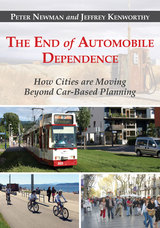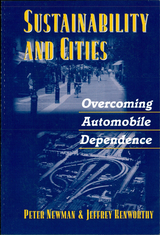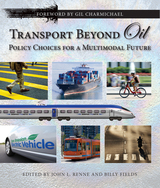3 books by Kenworthy, Jeffrey

The End of Automobile Dependence
How Cities are Moving Beyond Car-Based Planning
Peter Newman and Jeffrey Kenworthy
Island Press, 2015
Cities will continue to accommodate the automobile, but when cities are built around them, the quality of human and natural life declines. Current trends show great promise for future urban mobility systems that enable freedom and connection, but not dependence. We are experiencing the phenomenon of peak car use in many global cities at the same time that urban rail is thriving, central cities are revitalizing, and suburban sprawl is reversing. Walking and cycling are growing in many cities, along with ubiquitous bike sharing schemes, which have contributed to new investment and vitality in central cities including Melbourne, Seattle, Chicago, and New York.
We are thus in a new era that has come much faster than global transportation experts Peter Newman and Jeffrey Kenworthy had predicted: the end of automobile dependence. In The End of Automobile Dependence, Newman and Kenworthy look at how we can accelerate a planning approach to designing urban environments that can function reliably and conveniently on alternative modes, with a refined and more civilized automobile playing a very much reduced and manageable role in urban transportation. The authors examine the rise and fall of automobile dependence using updated data on 44 global cities to better understand how to facilitate and guide cities to the most productive and sustainable outcomes.
This is the final volume in a trilogy by Newman and Kenworthy on automobile dependence (Cities and Automobile Dependence in 1989 and Sustainability and Cities: Overcoming Automobile Dependence in 1999). Like all good trilogies this one shows the rise of an empire, in this case that of the automobile, the peak of its power, and the decline of that empire.
We are thus in a new era that has come much faster than global transportation experts Peter Newman and Jeffrey Kenworthy had predicted: the end of automobile dependence. In The End of Automobile Dependence, Newman and Kenworthy look at how we can accelerate a planning approach to designing urban environments that can function reliably and conveniently on alternative modes, with a refined and more civilized automobile playing a very much reduced and manageable role in urban transportation. The authors examine the rise and fall of automobile dependence using updated data on 44 global cities to better understand how to facilitate and guide cities to the most productive and sustainable outcomes.
This is the final volume in a trilogy by Newman and Kenworthy on automobile dependence (Cities and Automobile Dependence in 1989 and Sustainability and Cities: Overcoming Automobile Dependence in 1999). Like all good trilogies this one shows the rise of an empire, in this case that of the automobile, the peak of its power, and the decline of that empire.
[more]

Sustainability and Cities
Overcoming Automobile Dependence
Peter Newman and Jeffrey Kenworthy
Island Press, 1999
Sustainability and Cities examines the urban aspect of sustainability issues, arguing that cities are a necessary focus for that global agenda. The authors make the case that the essential character of a city's land use results from how it manages its transportation, and that only by reducing our automobile dependence will we be able to successfully accommodate all elements of the sustainability agenda.
The book begins with chapters that set forth the notion of sustainability and how it applies to cities and automobile dependence. The authors consider the changing urban economy in the information age, and describe the extent of automobile dependence worldwide. They provide an updated survey of global cities that examines a range of sustainability factors and indicators, and, using a series of case studies, demonstrate how cities around the world are overcoming the problem of automobile dependence. They also examine the connections among transportation and other issues—including water use and cycling, waste management, and greening the urban landscape—and explain how all elements of sustainability can be managed simultaneously.
The authors end with a consideration of how professional planners can promote the sustainability agenda, and the ethical base needed to ensure that this critical set of issues is taken seriously in the world's cities.
Sustainability and Cities will serve as a source of both learning and inspiration for those seeking to create more sustainable cities, and is an important book for practitioners, researchers, and students in the fields of planning, geography, and public policy.
The book begins with chapters that set forth the notion of sustainability and how it applies to cities and automobile dependence. The authors consider the changing urban economy in the information age, and describe the extent of automobile dependence worldwide. They provide an updated survey of global cities that examines a range of sustainability factors and indicators, and, using a series of case studies, demonstrate how cities around the world are overcoming the problem of automobile dependence. They also examine the connections among transportation and other issues—including water use and cycling, waste management, and greening the urban landscape—and explain how all elements of sustainability can be managed simultaneously.
The authors end with a consideration of how professional planners can promote the sustainability agenda, and the ethical base needed to ensure that this critical set of issues is taken seriously in the world's cities.
Sustainability and Cities will serve as a source of both learning and inspiration for those seeking to create more sustainable cities, and is an important book for practitioners, researchers, and students in the fields of planning, geography, and public policy.
[more]

Transport Beyond Oil
Policy Choices for a Multimodal Future
Edited by John L. Renne and Billy Fields, Foreword by Gilbert E. Carmichael
Island Press, 2012
Seventy percent of the oil America uses each year goes to transportation. That means that the national oil addiction and all its consequences, from climate change to disastrous spills to dependence on foreign markets, can be greatly reduced by changing the way we move. In Transport Beyond Oil, leading experts in transportation, planning, development, and policy show how to achieve this fundamental shift.
The authors demonstrate that smarter development and land-use decisions, paired with better transportation systems, can slash energy consumption. John Renne calculates how oil can be saved through a future with more transit-oriented development. Petra Todorovitch examines the promise of high-speed rail. Peter Newman imagines a future without oil for car-dependent cities and regions. Additional topics include funding transit, freight transport, and nonmotorized transportation systems. Each chapter provides policy prescriptions and their measurable results.
Transport Beyond Oil delivers practical solutions, based on quantitative data. This fact-based approach offers a new vision of transportation that is both transformational and achievable.
The authors demonstrate that smarter development and land-use decisions, paired with better transportation systems, can slash energy consumption. John Renne calculates how oil can be saved through a future with more transit-oriented development. Petra Todorovitch examines the promise of high-speed rail. Peter Newman imagines a future without oil for car-dependent cities and regions. Additional topics include funding transit, freight transport, and nonmotorized transportation systems. Each chapter provides policy prescriptions and their measurable results.
Transport Beyond Oil delivers practical solutions, based on quantitative data. This fact-based approach offers a new vision of transportation that is both transformational and achievable.
[more]
READERS
Browse our collection.
PUBLISHERS
See BiblioVault's publisher services.
STUDENT SERVICES
Files for college accessibility offices.
UChicago Accessibility Resources
home | accessibility | search | about | contact us
BiblioVault ® 2001 - 2024
The University of Chicago Press









